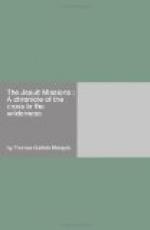Of religion as it is understood by Christians the Hurons had none, nothing but superstitions, very like those of other barbarous peoples. To everything in nature they gave a god; trees, lakes, streams, the celestial bodies, the blue expanse, they deified with okies or spirits. Among the chief objects of Huron worship were the moon and the sun. The oki of the moon had the care of souls and the power to cut off life; the oki of the sun presided over the living and sustained all created things. The great vault of heaven with its myriad stars inspired them with awe; it was the abode of the spirit of spirits, the Master of Life. Aronhia was the name they gave this supreme oki. This would show that they had a vague conception of God. To Aronhia they offered sacrifices, to Aronhia they appealed in time of danger, and when misfortune befell them it was due to the anger of Aronhia. But all this had no influence on their conduct; even in their worship they were often astoundingly vicious.
To such dens of barbarism had come men fresh from the civilization of the Old World—men of learning, culture, and gentle birth, in whose veins flowed the proudest blood of France. To these savages, indolent, superstitious, and vicious, had come Brebeuf, Noue, and Daillon, with a message of peace, goodwill, and virtue.
Until the middle of October the three fathers lived together at Toanche, save that Daillon went on a brief visit to Ossossane, on the shore of Nottawasaga Bay. The Recollet, however, had instructions from his superior Le Caron to go to the country of the Neutrals, of which Champlain’s interpreter, Etienne Brule, had reported glowingly, but which was as yet untrodden by the feet of missionaries. And so on the 18th of October 1626 Daillon set out on the trail southward, with two French traders as interpreters, and an Indian guide. Arriving among the Neutrals, after a journey of five or six days, he was at first kindly received in each of the six towns which he visited. But this happy situation was not to last. The Neutral country, now the richest and most populous part of Ontario, boasting such cities as Hamilton and Brantford and London, was rich in fur-bearing animals and tobacco; and the Hurons were the middlemen in trade between the Neutrals and the French. The Hurons, fearing now that they were about to lose their business—for it was rumoured that Daillon was seeking to have the Neutrals trade directly with the French—sent messengers to the Neutrals denouncing the grey-robe as a sorcerer who had come to destroy them with disease and death. In this the Neutral medicine-men agreed, for they were jealous of the priest. The plot succeeded. The Indians turned from Daillon, closed their doors against him, stole his writing-desk, blanket, breviary, and trinkets, and even threatened him with death. But Brebeuf learned of his plight, probably from one of the Hurons who had raised the Neutrals against him, and sent a Frenchman and an Indian runner to escort him back to Toanche.




